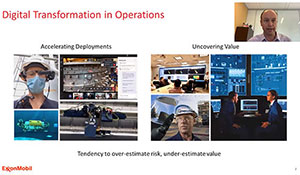June 6-9, 2022 - Orlando, Florida | June 20-23, 2022 - Online
ARC Industry Forum Makes a Strong In Person Return to Orlando
With a strong return to the in-person format, ARC Advisory Group hosted close to 900 attendees at its recent Industry Forum in Orlando. Attendees were able to learn about the latest successful digital transformation strategies from leading end user companies, take advantage of networking opportunities, and see many of the latest technologies and solutions in action.
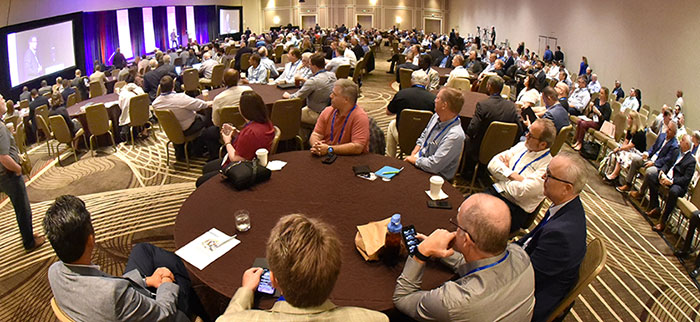
While the worst of COVID appears to be over, the pandemic accelerated digital transformation strategies among both end users and suppliers. These companies are continuing their momentum as they deal with the ongoing challenges of supply chain disruption, the “great resignation,” and many other people, process and technology related challenges.
ARC has always strived to bring superior content to our Forum in the form of substantive end user-focused presentations that our attendees can learn from and apply this knowledge to their own operations. Attendees learned about successful digital transformation strategies, the convergence of IT and OT domains, industrial and critical infrastructure cybersecurity, and the future of open automation.
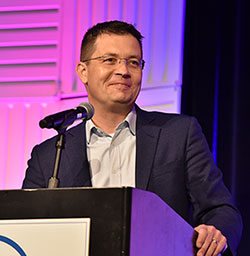 PureCycle Technologies on Being “Born Digital”
PureCycle Technologies on Being “Born Digital”
The first end user keynote speaker was Dustin Olson, CEO of PureCycle Technologies. PureCycle is a unique company that recycles polypropylene plastic, which is the most popular plastic in the world, but only about 5 percent of it gets recycled. Current methods of Polypropylene recycling typically produce a low value resin that can only be used to make things like park benches and other utilitarian applications. PureCycle’s mission is to recycle this polypropylene into ultra-pure recycled plastic through its own proprietary process that removes all dyes, odors, and other contaminants from the polypropylene, leaving a highly pure resin that can be used to manufacture a wide range of products and packaging.
With a completely new process for recycling at a company that is focused on sustainability with ambitious growth plans, adopting a digital strategy was a necessary step for meeting corporate objectives. As a new company without the legacy of an installed base of technology, Dustin spoke about how PureCycle was really “Born Digital,” incorporating digitalization concepts and technologies from its inception.
Bank of America: The Future Is Software
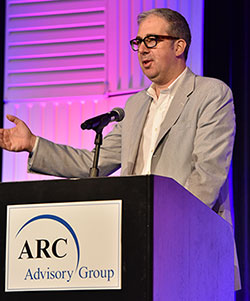 Andrew Obin, Managing Director of Bank of America Merrill Lynch Equity Research gave his company’s take on the impact of digital transformation on markets. One of the key points brought out was the shift in manufacturing CapEx budgets from equipment to software. The manufacturing industry has always been asset intensive, but the statistics presented clearly illustrate a huge shift in CapEx spending to intellectual property versus equipment and structures in the manufacturing sector, and much of this intellectual property comes in the form of software investments.
Andrew Obin, Managing Director of Bank of America Merrill Lynch Equity Research gave his company’s take on the impact of digital transformation on markets. One of the key points brought out was the shift in manufacturing CapEx budgets from equipment to software. The manufacturing industry has always been asset intensive, but the statistics presented clearly illustrate a huge shift in CapEx spending to intellectual property versus equipment and structures in the manufacturing sector, and much of this intellectual property comes in the form of software investments.
The increased investment in software isn’t just on the end user side. Industrial suppliers are investing more than ever in software companies, with a huge jump in transaction volume starting around 2012 and continuously accelerating through 2021. Andrew provided examples of dozens of software acquisitions between 2019 and 2021 by most of the major automation and industrial suppliers. But there is still progress to be made. As Andrew pointed out, the oil and gas industry in particular has a long way to go before its overall investments in software approach the same level as those in the rest of the manufacturing sector. Intellectual property investment as a percent of revenue still lags significantly for the oil and gas industry as well, and Andrew pointed out that it still takes the same number of people to get a barrel of oil out of the ground today as it did 40 years ago.
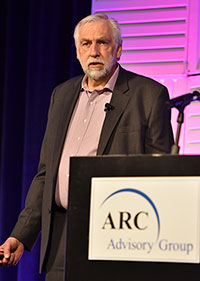 Greg Gorbach Discusses the ARC Digital Transformation Top 25
Greg Gorbach Discusses the ARC Digital Transformation Top 25
ARC Vice President Greg Gorbach closed out the Tuesday keynote sessions by discussing the formation of the recent ARC Digital Transformation Top 25 ranking system and annual report. The first edition of the ARC DT Top 25 came out earlier this year. Digital transformation leaders across many different industries share common traits and visions, helping them overcome complex challenges to innovate and stay agile. Industrial innovation continues to accelerate, and leading companies have their transformation initiatives well underway. The ARC industrial digital transformation top 25 highlights companies that are succeeding at integrating digital technology into all areas of their business, fundamentally changing the way they operate and deliver value to their customers. You can download the full ARC Digital transformation Top 25 report here.
Executive Panel Discussion on Successful Digital Transformation
To conclude the Tuesday morning keynotes, Dustin Olson and Andrew Obin then joined an executive panel discussion along with Whit McConnell, Chief Automation and Process Control Engineer of ExxonMobil and Linda Rae, General Manager of Power Generation and Oil and Gas for GE Digital. Nathan Pettus, President of the Process Systems and Solutions business at Emerson Automation Solutions also joined the panel, which was moderated by ARC President and CEO Andy Chatha.
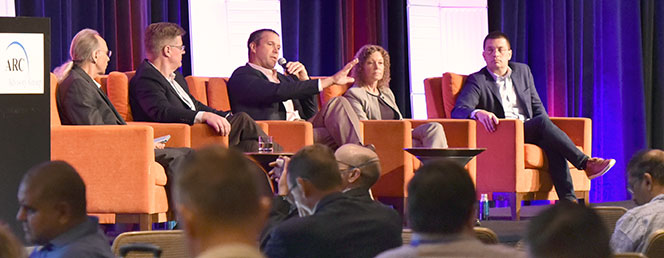
The discussion touched on a variety of topics. Linda Rae commented on the challenges of the changing work environment by stating that when we do bring employees together in an office setting, we must also bring out the strengths of having them in that setting. Whit McConnell talked about the value that ExxonMobil is deriving from advanced analytics, and Nathan Pettus commented on the increased adoption of virtual system engineering methodologies in the wake of COVID.
Pfizer Digital: What Digital Transformation Leaders Do Differently and Why
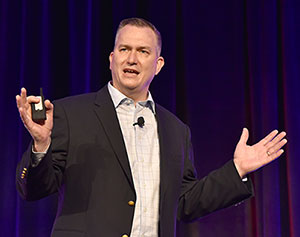 At the General Session on Wednesday morning, Vice President of Digital Manufacturing at Pfizer Digital Mike Tomasco spoke about the digital transformation journey at Pfizer, which is probably the best example we had at the Forum of how a good digital transformation strategy can make the seemingly impossible, possible. Pfizer was one of the companies tasked with developing the COVID vaccine, and Mike gave the example of Pfizer CEO Dr. Albert Bourla’s book Moonshot, which describes how Pfizer expanded their Digital Operations Center in their successful nine-month race to develop a vaccine.
At the General Session on Wednesday morning, Vice President of Digital Manufacturing at Pfizer Digital Mike Tomasco spoke about the digital transformation journey at Pfizer, which is probably the best example we had at the Forum of how a good digital transformation strategy can make the seemingly impossible, possible. Pfizer was one of the companies tasked with developing the COVID vaccine, and Mike gave the example of Pfizer CEO Dr. Albert Bourla’s book Moonshot, which describes how Pfizer expanded their Digital Operations Center in their successful nine-month race to develop a vaccine.
Mike also offered some concrete advice on how to succeed in digital transformation projects, the most notable of which was “Do something. If that does not work, try something else - a saying I wrote on my white board that was there for four years until someone erased it. Make decisions and take action. It’s so much better than over thinking things and never making a decision. You just cannot make progress unless you try. Also… failure is fine. Just learn from it and try something else.”
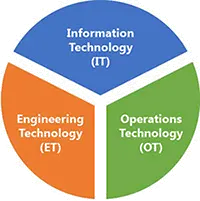 Leading industrial companies are actively engaged in transformation programs that will reshape their production operations to be more integrated, responsive, and optimized to meet business and customer needs. Realizing these innovations requires an understanding of the emerging 21st century operations ecosystem and how it interacts with business, engineering, supply chain, and other organizations. Today's connected environments surface machine data that was heretofore unavailable, and so enable new business models. New systems may monitor the assets, and new actors may interact with the assets in new ways. Industrial plant operations, typically siloed and fairly isolated today, will be reshaped as the core of a 21st century industrial production operations ecosystem. A similar evolution is taking place for field operations - such as mining or agriculture. In other cases, such as automotive, where the assets operate in public spaces and both the assets and ecosystems are evolving quickly, other factors come into play.
Leading industrial companies are actively engaged in transformation programs that will reshape their production operations to be more integrated, responsive, and optimized to meet business and customer needs. Realizing these innovations requires an understanding of the emerging 21st century operations ecosystem and how it interacts with business, engineering, supply chain, and other organizations. Today's connected environments surface machine data that was heretofore unavailable, and so enable new business models. New systems may monitor the assets, and new actors may interact with the assets in new ways. Industrial plant operations, typically siloed and fairly isolated today, will be reshaped as the core of a 21st century industrial production operations ecosystem. A similar evolution is taking place for field operations - such as mining or agriculture. In other cases, such as automotive, where the assets operate in public spaces and both the assets and ecosystems are evolving quickly, other factors come into play.
In 21st century production operations, work is accomplished with a combination of internal and external actors (such as asset manufacturers, 3rd party machine monitoring services, spare parts suppliers, etc.), putting new demands on data requirements and cybersecurity strategies. New types of production systems (such as additive manufactuiring) and new types of data are being generated (from wearables, vision systems, machine health sensors, etc.). And digital twins and machine learning systems can work at various levels to optimize the overall system in synchrony with the needs of customers and business operations.
An important enabler for this innovation in industrial companies is the convergence of IT (Information Technology at the enterprise level), OT (Operations Technology, the information and automation technologies employed in the plant), and ET (Engineering Technology, the newer technologies that create virtual models). IT/OT/ET convergence is among the drivers of the digital transformation that leading companies are embarking upon. A wide range of technologies, such as Ethernet/Wi-Fi, virtualization, cloud, SaaS, analytics, Big Data, mobile, social, modeling, augmented reality, machine learning, remote monitoring, and digital twin are now being employed in industrial operations to improve operating performance, create a virtual environment, or introduce the Industrial Internet of Things. But the big payoff comes when companies begin to operate in new, collaborative ways across the whole of the enterprise.
This program features speakers talking about moving to 21st century operating models, and how they utilized the IT/OT/ET enablers of digitization and innovation to improve performance in their production operations and throughout their organizations.
Most industrial companies still tend to make decisions based on habitual ways of doing things, tribal knowledge, rules-of-thumb, and the opinions of in-house experts. But leading companies are moving to an information-driven culture and business model in which all decisions are made based on analysis of operations and business process data. Throughout the organization, these companies employ software to collect, contextualize, visualize, and analyze data to gain new insights. The common question is, “What does the data tell us?” Armed with new insights, organizations can anticipate changes and drive better business results.
It is clear that the use of analytics in industrial companies is growing rapidly. With the industrial space becoming much more dynamic, manufacturers are turning to advanced analytics and machine learning to support predictive and prescriptive solutions. More companies are pursuing analytics solutions and more employees throughout the enterprise want more and better decision tools. And the increasing focus on Smart Manufacturing, Industrie 4.0 (I4.0), and Industrial Internet of Things (IIoT) is driving demand for predictive maintenance and operating performance improvement solutions, which rely on advanced analytics.
This program will:
- Cut through the confusion surrounding 'analytics' in the industrial space
- Provide a useful conceptual framework for differentiating modern analytics platforms from previous approaches
- Highlight new technologies, platforms, architectures, and processes
- Present case studies and examples from early adopters of new analytics systems
- Provide industrial companies the information they need to begin their own analytics journey
Asset Performance Management incorporates Industrial IoT (IIoT) and new analytics solutions like machine learning. It uses information from production management, control systems, and asset management applications to provide new opportunities to optimize asset availability and operational performance. This optimization goes beyond functional silos and occurs between silos where significant inefficiency, waste, and sometimes dysfunction often reside.
Balancing the objectives of operations for on-time delivery, volume, and quality with those of maintenance for asset availability, longevity, and reliability requires sharing information and harmonizing these objectives with the goals of the enterprise. New information technologies provide functionality to intensify cross-functional collaboration, business process improvements, and higher levels of performance to achieve asset performance management excellence.
The ability to interact with equipment – like a variety of devices on a single site, or widely dispersed machines – presents new opportunities for industrial companies, utilities, and equipment suppliers. These networks provide a new “connected ecosystem” of equipment manufacturers, systems integrators, and end users. Some manufacturers and utilities have begun adopting these technologies.
Those attending this Asset Performance Management program will learn what was successful, and gain insights into what is next. The objective is to make fact-based decisions using reliable information that aligns with the organization’s objectives. An APM strategy helps ensure the best possible returns on capital investments over the lifecycle of the asset. If you are involved in operations, maintenance, or industrial IT, you will want to attend these program sessions.
We have entered a period of intense innovation in industrial automation. In the areas of high value-added manufacturing there is growing global competition. Countries with developed economies want to maintain and grow their existing competitive advantages and support their exporting industries. Countries with developing economies want to improve their competitiveness as well.
This competition is, in part, taking the form of national initiatives to improve manufacturing competitiveness. These initiatives are found in Germany, the US, Japan, Korea, and China. In the US the Industrial Internet Consortium has formed. Platform Industrie 4.0 is the German initiative; the “4.0” referring to a 4th industrial revolution (following steam, mass production, and IT). This can be thought of as a set of new technologies that are fusing the physical, digital, and biological worlds, and impacting all disciplines, economies and industries.
Some of the topics that will be covered in the sessions for this program include:
Devices that will use the future 2‐wire Ethernet standard now in development by the IEEE 802.3cg committee. This 2019 standard will enable high speed communication to process field devices over distances as long as 1 kM.
The Open Process Automation Forum: The Latest Update
The Open Group’s Open Process Automation Forum is noteworthy for several reasons. First, because of its genesis within ExxonMobil, a leading international oil company with a long reputation for operational excellence. Second, because the products of this program will be technologically quite different from the process automation systems used today. Third, because the value chain envisioned for this program is also quite different from the way the process automation market works today. The latest developments in this initiative will be presented and discussed.
Industrial Automation and the Industrie 4.0/Industrial Internet Initiatives
What will be the impact on manufacturing and automation of these major national initiatives? How will the process industries, discrete manufacturers, and automation suppliers adapt and change their products in response to these programs? What are thought leaders in Europe and North America doing now and planning for the next few years? End users will present the current programs for rapid integration of skid-mounted process systems, based on the Module Type Package (MTP) initiative of the NAMUR group in Europe. Also, European end users will discuss their pilot work with the future 2‐wire “single pair Ethernet” standard now in development by the IEEE 802.3cg committee. This 2019 standard will enable high speed communication to process field devices over distances as long as 1 kM.
Connectivity is revolutionizing the way industrial companies operate. Connected workers are using remote access to IT, ET, and OT systems, and colleagues to support operations around the world. Workers in plants and construction sites are using connectivity to get the information and support they need to solve problems faster and more accurately. Anywhere, anytime, any device support is lowering costs, increasing productivity, and reducing operational downtimes. Reliable, high speed, connectivity is also enabling more use of cloud-based solutions and data sharing with suppliers and other facilities.
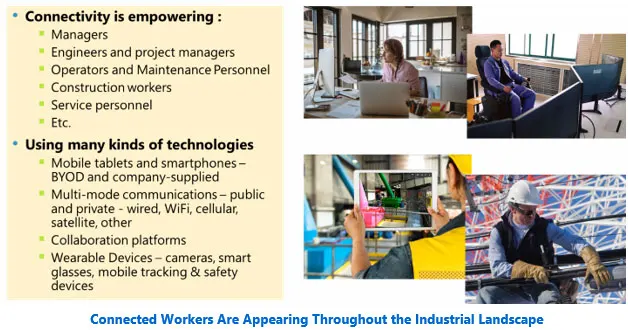
Cybersecurity has never been more important. Connectivity projects are rapidly expanding the pathways for attackers to steal information and disrupt operations. At the same time, industrial security teams are struggling to deal with ransomware and sophisticated nation-state attacks. This situation is jeopardizing worker safety, delivery of critical services, and the operational continuity of plants and facilities that fuel profitability.
Conventional, siloed IT and OT security programs weren’t designed to handle all of these challenges. Industrial organizations need security strategies that monitor, control, and coordinate security across every corporate device, application, system, and network regardless of where it is located. Security programs also need to ensure consistent management across IT, ET, OT, Cloud, Mobile, and IoT environments. Likewise, security needs to span every worker regardless of where, when, and how they are doing their jobs. Developing a comprehensive cybersecurity strategy that addresses the risks of the connected industrial world has never been more urgent.
The Industrial Cybersecurity program at the 2022 ARC Industry Form Americas addresses these issues with informative workshops, panel discussions, and case study presentations. It is the ideal venue to learn what others are doing, how they are doing it, and the benefits they are achieving. Attendees will also have opportunities to discuss their unique challenges with peers, researchers, educators, service providers, and solution providers.
Autonomy and intelligence embedded pervasively in automation equipment is one of the key attributes to realization of connected smart machinery. Connected smart machinery is important in virtually every application imaginable, but is even more valuable in cases where there is limited communications. Machinery that analyzes and compresses large data sets are essential to ensuring that the data traffic on the Internet does not overwhelm the system or data can be analyzed local to the device. The connected smart machine will require not just more sensors, but also more intelligent sensors. Sensors must perform more sophisticated signal processing “at the edge” to provide accurate signals that filter out the noise before it gets to the automation system.
In this program, machine builders employing intelligent sensors into the machinery to perform complex condition monitoring algorithms into automation systems will be highlighted. Key topics for discussion include:
- Creating new maintenance service revenue streams for machine builders
- Development of equipment protection algorithms that increase resilience of machinery to stay operational for much longer periods of time.
- Adaptive control algorithms allowing systems to operate over a wider range.
- Predictive condition monitoring systems that use real-time control algorithms to provide a new level of maintenance information.
- Exploring the potential of the Industrial Internet of Things (IIoT) to combine the benefits of multivariate analysis, predictive modeling, and inferential information to preempt abnormal situations.
The digital transformation of industry, infrastructure, and cities is under way, with new business processes, services, and models being pursued. This energy and investment is a rational response by organizations to digital economies that present new and very real opportunities. When combined appropriately, data and technology can provide competitive advantage, that – in some cases – enables organizations to leapfrog their peers.
Yet, when planning or executing this transformation, what is often missing is a focus on the human element of digital transformation. Where do people fit in? The changes that digital transformation will have on the workforce are likely to be the most far-reaching and sustained effects. Not only will digital transformation change the number of people needed to do work, it will rewrite how that work gets. Those going through digital transformation quickly realize that managing the human element can be the most difficult aspect. However, as they work through their journey, people begin to better understand the human-centric benefits of digital transformation. Enabled by technology, the workforce will become more empowered to identify challenges, adapt to circumstances, and find new ways to solve problems.
This program will:
- Discuss digital transformation through the lens of people, examining the changes in the workforce as organizations become increasingly data-enabled and service-based.
- Identify the common human-centered challenges to successful digital transformation.
- Provide a framework for creating an organizational strategy and culture for digital change
- Present case studies of how companies organized people and work cultures around digital-first thinking
- Outline how to evolve customer relationships and engagement for a digital world
Industrial Internet platforms are emerging as pivotal, value-added components of the Industrial Internet of Things (IIoT) architecture. These platforms add incremental value by functioning not only as the glue linking connected industrial devices to higher level performance-enhancing applications, but also as the execution environment for the applications themselves.
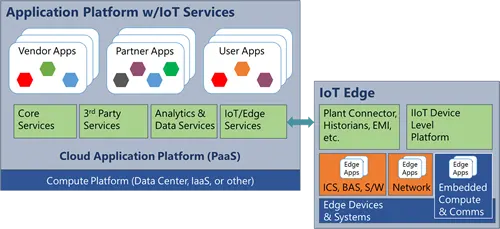 Industrial Internet platforms play an integral role in analytics, big data, remote asset monitoring, performance management, decision support, universal visualization, and the value chains for connected products and products-as-a-service. The ability of these applications to access, analyze, and process industrial data is central to the IIoT value proposition.
Industrial Internet platforms play an integral role in analytics, big data, remote asset monitoring, performance management, decision support, universal visualization, and the value chains for connected products and products-as-a-service. The ability of these applications to access, analyze, and process industrial data is central to the IIoT value proposition.
Industrial Internet platforms architecturally reside between intelligent devices and higher levels of the enterprise architecture. Device connectivity platforms monitor, collect, process, and transmit data from a variety of intelligent sensors, devices, machines, products, and other assets to higher levels of the architecture, while analytics, big data, machine learning, and numerous other applications that deliver incremental process improvements typically reside in enterprise-level platforms.
The IoT network edge has emerged as a primary vehicle for delivering incremental business value via internet-enabled business strategies such as the Industrial Internet of Things (IIoT), Industrie 4.0 (I4.0), and Smart Cities and Infrastructure.
Escalating demands to feed information from data-rich intelligent edge devices to the cloud is one of the most pressing issues facing OT and IT professionals in the era of internet-enabled business strategies. Standard options include support of common API or protocols, but cloud-based agents themselves are migrating into network edge devices. These agents are increasingly viewed as not only vehicles for closer edge-to-cloud integration, but also as platforms for edge computing applications that execute locally, offloading processing from the cloud and providing enhanced security and closer to real time performance.
This program will highlight current and prospective demands on both network edge infrastructure, such as gateways, routers, and switches, as well as smart end devices that function as edge nodes in the IoT architecture. In addition, this program will look at the central role of Industrial Internet platforms in the emerging Industrial Internet of Things and how to use them to achieve incremental business benefit.
Featured Speakers
The following executives are featured speakers at the Forum.
Dustin Olson
Chief Operating Officer
PureCycle Technologies
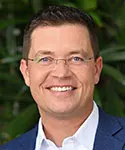 Dustin leads all global operations including manufacturing, procurement, sustainability, commercial sales, and joint venture partnerships. PureCycle’s mission to transform the world’s polypropylene recycling industry builds upon his solid leadership principles as he works to reimagine the day-to-day business environment. Dustin values collaboration and embraces diversity to create high-functioning teams and encourage better decision making. His breadth of experience creates a unique cross- functional and cross-cultural perspective to draw alignment between diverse viewpoints. Dustin spent more than 20 years developing a diverse career path across refining, olefins, specialty chemicals, and specialty polymers throughout the US, The Netherlands, and China. As a business leader in Shanghai, he was responsible for the Asia Pacific, Africa, Middle East, and India business units, and led the successful regional integration of two major companies while achieving year-over-year financial growth. Earlier in his career, he held senior leadership roles in manufacturing, commercial, and business support functions in refining, commodity chemicals, and specialty polymer business units across the world.
Dustin leads all global operations including manufacturing, procurement, sustainability, commercial sales, and joint venture partnerships. PureCycle’s mission to transform the world’s polypropylene recycling industry builds upon his solid leadership principles as he works to reimagine the day-to-day business environment. Dustin values collaboration and embraces diversity to create high-functioning teams and encourage better decision making. His breadth of experience creates a unique cross- functional and cross-cultural perspective to draw alignment between diverse viewpoints. Dustin spent more than 20 years developing a diverse career path across refining, olefins, specialty chemicals, and specialty polymers throughout the US, The Netherlands, and China. As a business leader in Shanghai, he was responsible for the Asia Pacific, Africa, Middle East, and India business units, and led the successful regional integration of two major companies while achieving year-over-year financial growth. Earlier in his career, he held senior leadership roles in manufacturing, commercial, and business support functions in refining, commodity chemicals, and specialty polymer business units across the world.
Whit McConnell
Chief Automation and Process Control Engineer
ExxonMobil
 Whit is responsible for ExxonMobil’s technology strategy for process control and automation across all business lines. Whit joined Exxon in 1999 as a Control Systems Engineer supporting various DCS and advanced control environments. He has held a number of leadership roles in both downstream manufacturing and research & engineering. He helped drive standardized design and sustainment practices across the Corporation as well as technology transformations such as the introduction of server virtualization into industrial control environments. He currently supports a number of initiatives such as Open Process Automation and the use of cognitive technologies pursuant to autonomous operations capability. In a large corporation, collaboration is an important key to success and Whit is passionate about connecting different people and teams to focused objectives.
Whit is responsible for ExxonMobil’s technology strategy for process control and automation across all business lines. Whit joined Exxon in 1999 as a Control Systems Engineer supporting various DCS and advanced control environments. He has held a number of leadership roles in both downstream manufacturing and research & engineering. He helped drive standardized design and sustainment practices across the Corporation as well as technology transformations such as the introduction of server virtualization into industrial control environments. He currently supports a number of initiatives such as Open Process Automation and the use of cognitive technologies pursuant to autonomous operations capability. In a large corporation, collaboration is an important key to success and Whit is passionate about connecting different people and teams to focused objectives.
Michael Carroll
Vice President of Innovation
Georgia-Pacific
 With dog-years of experience as an industry executive, Mike’s background includes pulp and paper with Mead and Georgia-Pacific (GP), robotics and software as Deputy Chairman and CEO of UK based Shepard Ltd., and construction and building products as co-owner of Atlanta based McTech Group, a company serving fortune 500 companies including Walmart, Lowes, Home Depot, Kroger, and others. In 2010, Mike left retirement to join GP as Vice President of Innovation, where the MBM® philosophy and Mike’s mindset of innovation were in alignment. In 2019, he was named Innovator of the Year by ASPI, the Association of Suppliers to the Paper Industry. He also received the 2020 Visionary of the Year award from Smart Industry Magazine. He is involved in numerous innovations and transformations across GP and Koch Industries, and continues to be a frequent featured keynote speaker at industrial and manufacturing events around the world. He is recognized for his knowledge and experience in leadership, innovation, organizational transformation, and intellectual honesty.
With dog-years of experience as an industry executive, Mike’s background includes pulp and paper with Mead and Georgia-Pacific (GP), robotics and software as Deputy Chairman and CEO of UK based Shepard Ltd., and construction and building products as co-owner of Atlanta based McTech Group, a company serving fortune 500 companies including Walmart, Lowes, Home Depot, Kroger, and others. In 2010, Mike left retirement to join GP as Vice President of Innovation, where the MBM® philosophy and Mike’s mindset of innovation were in alignment. In 2019, he was named Innovator of the Year by ASPI, the Association of Suppliers to the Paper Industry. He also received the 2020 Visionary of the Year award from Smart Industry Magazine. He is involved in numerous innovations and transformations across GP and Koch Industries, and continues to be a frequent featured keynote speaker at industrial and manufacturing events around the world. He is recognized for his knowledge and experience in leadership, innovation, organizational transformation, and intellectual honesty.
Andrew Obin
Managing Director
Bank of America Merrill Lynch Equity Research
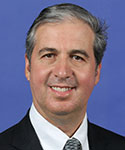 Andrew is a Managing Director covering the Multi Industry sector. Prior to assuming the Multi Industry coverage in 2012, he covered the Machinery and E&C sectors. Before joining Merrill Lynch in 2002, Andrew worked at Lehman Brothers following the Aerospace and Defense sector. Andrew has consistently been among top ranked analysts in II survey for the electrical equipment and multi-industry sectors as well as his past coverage of machinery and E&C sectors. He has been recognized for the quality of his stock picking and estimates by various industry surveys including Forbes, Financial Times, and the Wall Street Journal.
Andrew is a Managing Director covering the Multi Industry sector. Prior to assuming the Multi Industry coverage in 2012, he covered the Machinery and E&C sectors. Before joining Merrill Lynch in 2002, Andrew worked at Lehman Brothers following the Aerospace and Defense sector. Andrew has consistently been among top ranked analysts in II survey for the electrical equipment and multi-industry sectors as well as his past coverage of machinery and E&C sectors. He has been recognized for the quality of his stock picking and estimates by various industry surveys including Forbes, Financial Times, and the Wall Street Journal.
Jane Arnold
Vice President, Advanced Manufacturing Technology
Stanley Black & Decker
 Jane is the Vice President of Advanced Manufacturing Technology where her focus is to improve digitalization in manufacturing with a special emphasis on emerging technologies. She is a graduate of Oxford University’s Business Economic Program and has a degree in Mathematics from the University of Houston. Jane has over 30 years of experience in manufacturing technology, control engineering, and operations. She joined Stanley Black & Decker in February of 2021.
Jane is the Vice President of Advanced Manufacturing Technology where her focus is to improve digitalization in manufacturing with a special emphasis on emerging technologies. She is a graduate of Oxford University’s Business Economic Program and has a degree in Mathematics from the University of Houston. Jane has over 30 years of experience in manufacturing technology, control engineering, and operations. She joined Stanley Black & Decker in February of 2021.
Mike Tomasco
Vice President, Digital Manufacturing
Pfizer Digital
 Mike leads Pfizer Global Supply’s (PGS) Digital Transformation. The goal of the program is to transform PGS through a business strategy driven focus on digitization applied end to end across manufacturing and supply operations. Mike has experience across strategy, marketing, finance, manufacturing, and information systems for multinational companies and has successfully led several major transformational initiatives. Prior to his current role, he was responsible for establishing and leading the execution of the PGS Business Technology Strategy focused on a 3-5 year time horizon driving new systems and change across the organization. Concurrent with this role, he was the Chief of Staff for the Vice President of PGS and Finance Business Technology.
Mike leads Pfizer Global Supply’s (PGS) Digital Transformation. The goal of the program is to transform PGS through a business strategy driven focus on digitization applied end to end across manufacturing and supply operations. Mike has experience across strategy, marketing, finance, manufacturing, and information systems for multinational companies and has successfully led several major transformational initiatives. Prior to his current role, he was responsible for establishing and leading the execution of the PGS Business Technology Strategy focused on a 3-5 year time horizon driving new systems and change across the organization. Concurrent with this role, he was the Chief of Staff for the Vice President of PGS and Finance Business Technology.
Phil D’Antonio
Americas IT Director
Nissan
 Phil is a Director for Nissan Americas representing Nissan Digital across several business functions including: R&D engineering, supply chain management, manufacturing, purchasing, HR, finance, total customer satisfaction, and the Office of the CIO. Having a passion for programming early on, Phil graduated with a Computer Science degree, and a couple years later found himself at Nissan “chasing” vehicles and writing software to support manufacturing. Phil has accumulated 30 years of experience and is now focused on transforming teams and processes to meet the increasing complexity and demands on IT/IS while engaging business executives to ensure IT/IS is delivering top business priorities.
Phil is a Director for Nissan Americas representing Nissan Digital across several business functions including: R&D engineering, supply chain management, manufacturing, purchasing, HR, finance, total customer satisfaction, and the Office of the CIO. Having a passion for programming early on, Phil graduated with a Computer Science degree, and a couple years later found himself at Nissan “chasing” vehicles and writing software to support manufacturing. Phil has accumulated 30 years of experience and is now focused on transforming teams and processes to meet the increasing complexity and demands on IT/IS while engaging business executives to ensure IT/IS is delivering top business priorities.
Monday, June 6 - Orlando | June 20 - Online
| 8:30 AM | Workshop Sessions |
| 10:00 AM | Break |
| 10:30 AM | Workshop Sessions |
| 2:00 PM | Workshop Sessions |
| 3:30 PM | Break |
| 4:00 PM | Workshop Sessions |
Tuesday, June 7 - Orlando | June 21 - Online
| 8:30 AM | Keynote Presentations |
| 10:00 AM | Break |
| 10:30 AM | Executive Panel |
| 12:00 PM | Lunch |
| 2:00 PM | Concurrent Track Sessions |
| 3:30 PM | Break |
| 4:00 PM | Concurrent Track Sessions |
Wednesday, June 8 - Orlando | June 22 - Online
| 8:30 AM | Keynote and Executive Panel |
| 10:00 AM | Break |
| 10:30 AM | Concurrent Track Sessions |
| 12:00 PM | Lunch |
| 2:00 PM | Concurrent Track Sessions |
| 3:30 PM | Break |
| 4:00 PM | Concurrent Track Sessions |
Thursday, June 9 - Orlando | June 23 - Online
| 8:30 AM | Concurrent Track Sessions |
| 10:00 AM | Break |
| 10:30 AM | Concurrent Track Sessions |
| 12:00 PM | Forum Ends |
It was an honor and pleasure to be invited to speak at the ARC event. I was impressed with the level of knowledge I was exposed to at this conference; this will become an annual event for me. A sincere thank you to ARC for organizing a "WOW" event.
Marty Martin
Director, Process Control Technology

ARC Advisory Group industry events are extremely valuable (to Saudi Aramco). ARC is the barometer for our industry.
Abdullah Al-Khalifah
Senior Engineering Consultant

For me, since I’m from the pharma industry, coming to the ARC forum gives me a chance to interact with folks in like roles from different industries. It’s been very valuable for me to bring ideas and new connections back to my company and apply them to our business.
Kevin Fulton
Director of Engineering

It was a high honor for me to participate [at ARC's Forum] on behalf of the City of Orlando!
Charles Ramdatt
Director, Smart Cities and Special Projects

Innovations Showcase
New industry solutions are on display at the Innovations Showcase. The Showcase provides an excellent opportunity for executives to assess the potential for emerging applications in production management, interoperability, virtual manufacturing, process improvement, asset management, operations management, supply chain synchronization, and more. Exhibits have application scenarios for attendees to see how emerging technologies are applied to help solve issues across all industries.
The Showcase is open during the Monday Evening Reception and during breakfasts, breaks, and lunches. It is held adjacent to the forum where refreshments are served.
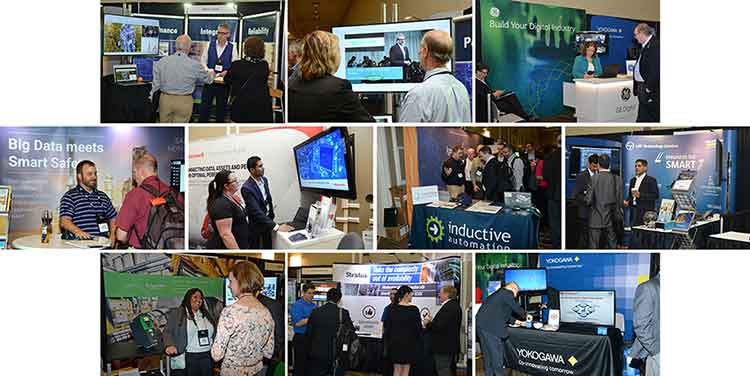
Location
 The Forum is held at the Renaissance Orlando Hotel in Orlando, Florida.
The Forum is held at the Renaissance Orlando Hotel in Orlando, Florida.
Renaissance Orlando at SeaWorld
6677 Sea Harbor Drive
Orlando, Florida 32821
renaissanceseaworldorlando.com
The Renaissance is just a short shuttle or taxi ride from the most popular Orlando attractions and within easy access of Orlando airports. Hotel amenities include complimentary 24 hour fitness center use; transportation to SeaWorld Orlando, Discovery Cove, Aquatica, and Universal Studios Orlando based on shuttle schedule; and public area wireless Internet.
Previous Attendees
The following companies have attended recent ARC forums:
Air Liquide
Akzo Nobel
Alliance Pipeline
AMEC Natural Resources
Anglo American
Archer Daniels Midland
Axiall
Bahrain Petroleum
BHP Billiton
Blackrock
BorgWarner
Bosch Rexroth
Brady
Cambell Soup
Cenovus Energy
CF Industries
Chevron
Church & Dwight
Comau
Connacher Oil and Gas
Consumers Energy
CORYS
Cummins
Danaher
Dell
Dominion Energy
DTE Energy
Duke Energy
Eaton
Elkay Manufacturing
EQUATE Petrochemical
Flint Hills Resources
Freeport McMoran
GE
Goodrich Petroleum
Goss International
Greater Cincinnati Water Works
Hirschmann Automation & Control
Independent Belgian Refinery
Inductive Automation
Infosys
International Paper
Iscar Metals
JHP Pharmaceuticals
John Deere
Joy Mining Machinery
Kollmorgen
Kongsberg
KUKA
L&T Infotech
Lafarge
Lockheed Martin
Lopez Foods
LyondellBasell
MESA
MillerCoors
Momentive Specialty Chemicals
Morgan Stanley
Mori Seiki
NAMUR
North West Redwater Partnership
Okuma America
Pacific Northwest National Lab
Palmer Foundry
Panasonic
Panduit
Paper Converting Machine
Parker Hannifin
Patti Engineering
Petro Rabigh
Petrobras
Phoenix Contact
PTC
Public Service Co. of New Mexico
Quiet Logistics
Red Arrow Logistics
Rolls-Royce
Ryder System
Sabic
Sandia National Laboratories
Sekuworks
Shell
Smurfit-Stone Container
Sony Electronics
TetraPak
TOTAL
Toyota Motor Manufacturing
U.S. Department of Energy
Universal Parks & Resorts
Vale
Valero Energy
Vallourec & Mannesmann do Brasil
Walt Disney World
Whirlpool
Wipro Technologies
Xerox
Yanbu National Petrochemical
Yaskawa

